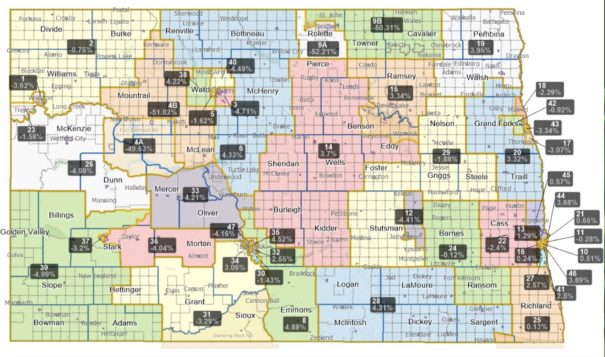News Based on facts, either observed and verified directly by the reporter, or reported and verified from knowledgeable sources.
North Dakota House draws new legislative subdistricts, brings two tribes to the table
 Proposed new district boundaries created by the North Dakota Redistricting Committee would create subdistricts for the Fort Berthold and Turtle Mountain reservations. HB 1504 cleared the House on Tuesday. It goes to the Senate floor Wednesday.
Proposed new district boundaries created by the North Dakota Redistricting Committee would create subdistricts for the Fort Berthold and Turtle Mountain reservations. HB 1504 cleared the House on Tuesday. It goes to the Senate floor Wednesday.
North Dakota’s redistricting committee brought their new maps – redrawn every 10 years – to their peers for a vote on Tuesday during the Legislature’s special session. The proposed redistricting bill would create subdistricts inclusive of the Fort Berthold and Turtle Mountain reservations.
The two reservations lie within legislative districts 4 and 9. The districts include significant American Indian populations, including citizens of the Mandan, Hidatsa, and Arikara Nation and the Turtle Mountain Band of Chippewa Indians. House Bill 1504 passed the legislature with a vote of 73-18.
“The passage of HB 1504 through the House today means we move closer to a truly representative body in the North Dakota state legislature, giving a stronger voice to a constituency that has long been underrepresented, in spite of being this land’s longest residents. Diverse perspectives, histories, and understandings in a body like the state legislature are absolutely necessary to ensure our state is moving forward,” Rep. Ruth Buffalo told the North Dakota Democrats-NPL. Buffalo is also an enrolled citizen of the MHA Nation. (Disclosure: Buffalo is a board member of the Indigenous Media Freedom Alliance, publisher of Buffalo’s Fire).
Despite overwhelming support from fellow lawmakers in the final vote, a handful of representatives argued against the passage of the bill, including Rep. Terry Jones, R-New Town who represents citizens of the Fort Berthold Reservation. He said the subdistricts were the equivalent of “racial gerrymandering.”
In addressing the Legislature, Buffalo said she questioned whether Jones had met with individuals of the MHA Nation. It is time, she said, the Mandan, Hidatsa and Arikara had a voice. The subdistricts legislation would meet the needs of the voters by taking down barriers and creating a more reflective government.
She said she was glad Jones addressed the issue low voter turnout on Fort Berthold. He said the people there had been outvoted in the past. Buffalo told lawmakers tribal citizens weren’t outvoted, but rather were victims of voter suppression who lacked equal access to the ballot box. For example, in the 2018 election, two voting precincts were shut down which created extreme barriers for rural voters.
Redistricting Committee Chair Rep. Bill Devlin, R-Finley, said his committee understood the Legislature’s need to be in compliance with the federal Voting Rights Act. He said he would not stand before the legislative assembly and tell them to ignore federal law. The bill, he said, was a necessity. “Does it meet federal law? It’s no question it does.”
The bill now moves to the Senate for approval.
This story was supported in part by a Solutions Journalism Network for advancing democracy.
Jodi Rave is the founder of the Indigenous Media Freedom Alliance, publisher of Buffalo’s Fire. She is an award-winning journalist and column writer. She now serves as a John S. Knight Community Impact Fellow for journalists at Stanford.
